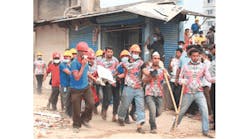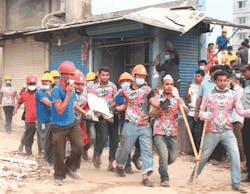Back on April 24th, Reshma Begum had little choice but to enter an unsafe factory. She, like 3 million other Bangladeshis, had entered into contracts that offered them meager wages – albeit better than other options – but with huge risks and clear penalties for stopping work.
Even as workers noticed cracks emerge and grow larger by the day, even after inspectors visited the factory and raised concerns, even after the bank on the first floor sent its employees home out of fear for their lives, still, workers felt obligated to go back into Rana Plaza's eight floors of factories.
The managers almost didn't need to threaten the workers. The workers at Rana Plaza were living paycheck to paycheck, and they knew they could be fired for not returning to work. The factory managers were under equally intense pressure. They knew their contracts with U.S. and European apparel brands and retailers stipulated that if they missed a delivery deadline, the factory would be forced to keep those garments, forbidden from selling them to anyone else, and bear all costs of the production. This literally could drive them into bankruptcy.
Rana Plaza's collapse was shocking and horrific. But it was not surprising. The tragedy was a clear symptom of the global apparel industry – and the outsourcing of responsibility for labor and environmental conditions in the factories that produce the goods we consume in the United States and Europe. The dry legalese of delivery times, pricing and penalties embedded in apparel contracts played a critical role in motivating factory managers to cut corners on safety, and pushing workers to return to a dangerous factory.
Clearly there is much blame to go around for the tragedy at Rana Plaza: irresponsible factory managers; overworked and under-resourced building inspectors; a highly conflicted (and sometimes corrupt) Bangladeshi government. But blame also squarely rests with brands and retailers from the United States and Europe.
Fast Fashion
An innocuous-sounding trend called "fast fashion" is one of the root causes of tragedies like Rana Plaza. The entire apparel industry – including inspectors and monitoring firms – has been pushed to speed up production, increase style changes and decrease costs. This pressure to simultaneously lower costs while increasing speed and delivery times drives factory managers to force workers into long hours at low pay. It also drives apparel manufacturers to seek out countries such as Bangladesh that are willing to meet these demands.
Bangladesh has virtually no cotton, polyester or other raw materials for apparel. The country has poor infrastructure, convoluted customs and slow transportation in and out of its ports. But what Bangladesh does have is cheap labor: $37 per month, which is half the average wages in Cambodia and one-fifth the wages in China.
These wages have powered Bangladesh to $20 billion per year in apparel exports, turning it into the No. 2 exporter of garments in the world, behind only China. Seventy-eight percent of these exports go to Europe and the United States.
The reputation of Bangladesh as one of the cheapest countries in the world to produce apparel is now matched by its reputation for disregarding labor, environmental and building safety regulations to meet supply chain demands.
Corporate initiatives to monitor and police these factories have failed to alter this reputation. Demanding that factories follow labor and environmental codes while pushing down prices and delivery times primarily has created incentives for factories to hide problems rather than solve them. Corporate social responsibility and monitoring systems have, at best, helped identify symptoms of problems. But they clearly have not gotten to the root causes of these tragedies. Companies have learned how to pass audits, while continuing to fail their workers.
Bangladesh Building and Fire Safety Accord
European brands and retailers responded to the Rana Plaza tragedy by signing onto the Bangladesh Building and Fire Safety Accord. The accord is the first binding agreement of its kind in Bangladesh; essentially a new type of contract requiring:
• Independent safety inspections with public reports;
• Mandatory repairs and renovations;
• An obligation on brands and retailers to pay the costs of building repairs;
• A commitment to terminating factories that don't improve; and,
• A real role for workers, including the governance of the accord.
The accord does not address all of the deeper systemic issues that continue to drive poor and unsafe working conditions in the apparel industry. But it is a first step in the right direction to bringing factories producing goods for Western markets up to the most basic standards of safe and humane working conditions.
U.S. brands and retailers refused to sign the accord, asserting that the legal commitments embedded in the accord – exactly what is needed – would cost too much and expose them to too great of legal liabilities. Instead, U.S. firms launched a voluntary initiative of their own, dubbed the Bangladesh Worker Safety Initiative, which loosely commits U.S. brands and retailers to: work with the Bangladeshi government to develop factory-assessment protocols; inspect all of the factories they use; pay for training of managers and workers; create a loan fund for factories to borrow money to make improvements; and make their inspections transparent.
The most obvious limitation of the U.S.-led initiative is that it is non-binding. It lacks even the most basic power of the contracts these brands sign everyday with factories. U.S. brands and retailers can quit at almost any time with little penalty. These companies largely will control the monitoring procedures. And the program requires Bangladeshi factories – which are under intense price pressures already – to pay for all repairs and improvements out of loans that must be repaid.
The deeper critique of the initiative is that it fails to address the root causes of problems in these factories. U.S. brands and retailers must move from checklist audits of these factories, or even standardized safety assessments, to a new kind of contractual agreement that commits to "responsible sourcing." Companies need to adjust contracts to guarantee that they pay the real costs of production – including the costs of providing safe and healthy work environments. They must adjust pricing and delivery-time requirements so that they can guarantee their garments are produced within legal wage and overtime limits. And they must adjust contracts to allow for flexibility in delivery if there is a serious problem in a supply chain or factory.
U.S. brands and retailers also need to advance fuller transparency that drives real changes in their supply chains. They actually must incentivize workers and managers to uncover problems and share that information. This quite literally is the opposite of the current environment.
Brands and retailers need to focus on preventing hazards and problems, not just recording them. Monitoring must become a form of collaborative problem-solving that seeks out root causes of problems, with full worker participation, and then commits to solving them.
Brands and retailers are the lynchpins of the global apparel system. And it is time for them to restructure their business processes and their contracts to source from countries like Bangladesh, while committing to providing safe, healthy and dignified jobs.
Dara O'Rourke is an associate professor at the University of California-Berkeley and the co-founder of GoodGuide. He studies the environmental, social and health impacts of global production systems and new strategies of governance, and currently is conducting research on a number of global supply chains – from resource extraction, to manufacturing, to use and disposal.

